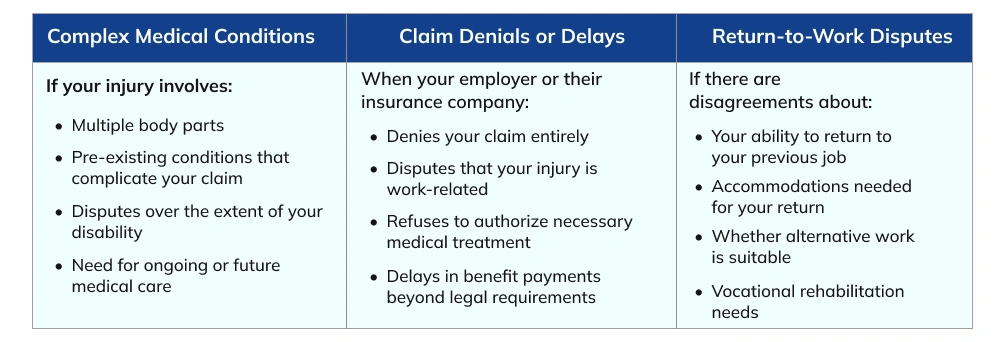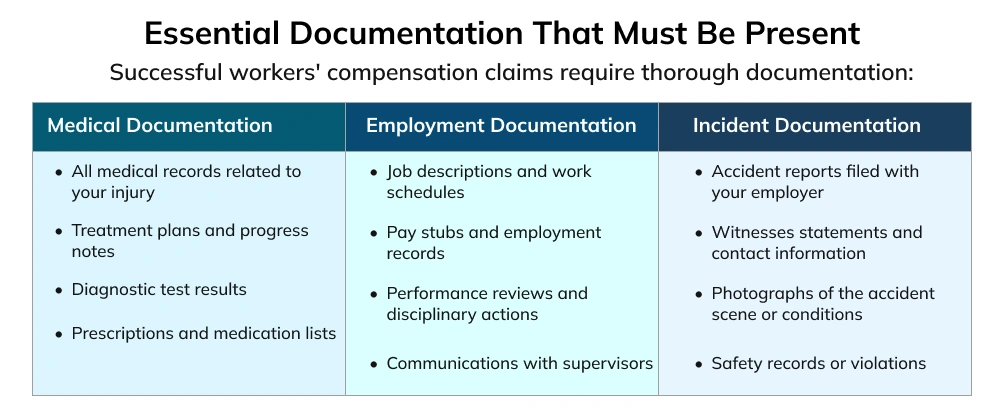Getting injured at work can turn your world upside down in an instant. One moment you’re focused on completing your daily tasks, and the next, you’re dealing with medical bills, lost wages, and uncertainty about your future. If you’re a California worker facing this challenging situation, understanding your workers’ compensation employee rights isn’t just helpful, it’s absolutely critical to protecting your livelihood and securing the benefits you deserve.
What many workers don’t realize is that California’s workers’ compensation laws are changing in 2025, with new protections and requirements that could significantly impact your claim. This comprehensive guide will walk you through everything you need to know about workers’ comp employee rights in California, including recent legislative updates that other resources might have missed.
What Makes California Workers’ Compensation Different in 2025?
California workers’ compensation operates under one of the most comprehensive systems in the United States, but 2025 brings significant changes that set the Golden State apart even further. With financial adjustments on the horizon, including a notable decrease in insurance costs and an increase in disability payments, workers now have enhanced protections and benefits.
The most significant development?
- TTD payment increase: As of Jan 1, 2025, the minimum TTD rises to $252.03/week and the maximum to $1,680.29/week. (Source)
- New employer notice (AB 1870): Employers must now post that injured workers can consult a licensed attorney at no up-front cost. (Source)
- Claim handling standard update: A tighter PAR audit standard (1.57376) is being enforced to improve claim processing. (Source)
This shift represents a major push toward transparency and employee empowerment, and many workers aren’t yet aware of these updates.
The Foundation of California Workers’ Compensation Law
Workers’ compensation in California is built on a “no-fault” system, meaning workers have the right to claim compensation benefits, regardless of who was responsible for the workplace accident. This principle forms the bedrock of California workers’ compensation law and ensures that injured employees receive support when they need it most.
However, understanding your rights goes far beyond knowing you can file a claim. The nuances of workers’ compensation law in California include specific timelines, procedures, and protections that can make or break your case.
Your Fundamental Workers’ Compensation Employee Rights in California
1. The Right to Immediate Medical Care
When you’re injured at work, your first concern should be your health, not paperwork. Under California workman’s comp laws, you have the absolute right to receive immediate medical treatment for your work-related injury. This includes:
- Emergency medical care without prior authorization
- Ongoing treatment from approved medical providers
- Specialized care when recommended by your treating physician
- Medical equipment and supplies necessary for your recovery
Important Note: Your employer cannot delay your medical care while investigating your claim. If they attempt to do so, this violates your fundamental rights under workers’ compensation laws in CA.
Explore common injury types and benefits in our post [Discover the Common Workers’ Compensation Injuries and Claims!]
2. The Right to Choose Your Doctor (Under Specific Conditions)
Many workers don’t realize they may have options when it comes to medical care. If you’ve predesignated a personal physician with your employer before your injury occurred, you can receive treatment from that doctor at your employer’s expense. Additionally, you can choose your own physician:
- 30 days after the initial injury
- In emergency situations
- When your employer denies you medical care
- With your employer’s written permission
3. The Right to Temporary Disability Benefits
When your injury prevents you from working, California workers’ compensation provides temporary disability benefits to help replace lost wages. These benefits are crucial for maintaining financial stability during your recovery period.
What is Labor Code Section 4650 and Why Does It Matters to You?
Labor Code Section 4650 is perhaps one of the most powerful protections for injured workers in California; yet, it’s often overlooked by both employees and some legal professionals. California Labor Code § 4650 requires workers’ compensation insurance companies to increase your temporary disability or permanent disability payments by 10% whenever they are late.
Understanding Timeline Requirements
Under Labor Code Section 4650, your employer and their insurance company must:
- Make temporary disability payments within 14 days of learning about the injury from the employee.
- Continue payments every two weeks thereafter.
- If the injury causes permanent disability, the first payment shall be made within 14 days after the last payment of temporary disability indemnity.
The 10% Penalty: Your Financial Protection
Here’s where many workers miss out on a significant amount of money. If your disability payment is even one day late, you would be entitled to an additional 10% payment. This penalty serves as both compensation for the delay and an incentive for insurance companies to pay on time.
Real-World Example: If your weekly temporary disability benefit is $800 and it’s paid three days late, you’re entitled to an additional $80 (10% of $800) for that payment period. Over several late payments, this can add up to thousands of dollars.
Additional Penalties Under Labor Code Section 5814
In cases of “unreasonable delay,” you may be entitled to an additional penalty of 25% or $10,000, whichever is less. This is separate from the 10% under Section 4650 and reflects California’s strong stance on timely payments.
Check our latest article on late-payment penalties in workers’ compensation cases.
Can You Be Fired for Filing a Workers’ Compensation Claim?
This is one of the most common fears among injured workers, and understanding your protections is crucial. Under workers’ compensation laws in CA, it is illegal for your employer to:
- Terminate your employment solely because you filed a workers’ compensation claim.
- Retaliate against you in any form for exercising your rights
- Discriminate against you during the claims process
- Coerce you into not filing a claim
What Elements Make Up Illegal Activities Retaliation?
Retaliation can take many forms beyond termination:
- Reduction in hours or pay
- Demotion or transfer to less desirable positions
- Harassment or hostile work environment
- Exclusion from meetings or workplace activities
- Negative performance reviews following your claim
If you experience any of these actions after filing a workers’ compensation claim, you may have grounds for additional legal action beyond your workers’ comp claim.
Understand your legal protections if your employer retaliates in our full article.
How Much Can You Receive in Workers’ Compensation Benefits?
California workers’ compensation benefits include several types of compensation:
1. Temporary Disability Benefits
- Temporary Total Disability (TTD): When you cannot work at all during recovery
- Temporary Partial Disability (TPD): When you can work but with restrictions that reduce your earning capacity
Calculation Method: Benefits are typically calculated as two-thirds of your average weekly wage, subject to maximum and minimum limits that are adjusted annually.
Learn how California calculates permanent vs temporary disability in depth here.
2. Permanent Disability Benefits
If your injury results in lasting impairment, you may be entitled to permanent disability benefits. These are calculated based on:
- Disability rating (expressed as a percentage)
- Your age at the time of injury
- Your occupation and ability to compete in the job market
- Your average weekly earnings before the injury
3. Medical Benefits
All reasonable and necessary medical treatment related to your work injury should be covered, including:
- Doctor visits and consultations
- Hospital stays and surgeries
- Physical therapy and rehabilitation
- Prescription medications
- Medical equipment and devices
When Should You Contact Work Comp Attorneys?
While you’re not required to have legal representation for a workers’ compensation claim, certain situations make hiring work comp attorneys practically essential:

Consider these common scenarios where hiring a workers’ compensation attorney could make a difference.
The Hidden Costs of Not Knowing Your Rights
Many California workers unknowingly forfeit thousands of dollars in benefits by not fully understanding their rights and entitlements. Here are the most common costly mistakes:
1. Accepting the First Settlement Offer
Insurance companies often present initial settlement offers that seem reasonable but may not account for:
- Future medical expenses
- Long-term disability impacts
- Vocational rehabilitation needs
- The full extent of your permanent disability
2. Not Reporting Injuries Promptly
California workman’s comp laws require you to report work injuries within 30 days. Delays can:
- Complicate your claim
- Give insurance companies grounds to dispute causation
- Limit your access to certain benefits
3. Failing to Document Everything
Proper documentation is crucial for protecting your rights:
- Keep records of all medical appointments
- Document communications with your employer
- Save all paperwork related to your claim
- Maintain a journal of how your injury affects your daily life
What to Do If Your Rights Are Violated
If you believe your workers’ compensation employee rights have been violated, immediate action is crucial:

Consult with Experienced Legal Counsel!
At Joseph Pluta Attorney At Law, we understand the complexities of California workers’ compensation law and have helped countless injured workers secure the benefits they deserve. Our experience with workers’ compensation laws in CA ensures that no detail is overlooked in protecting your rights.
Knowing the Appeals Process: Your Right to Challenge Decisions
One of your most important workers comp employee rights is the ability to appeal decisions you disagree with. The California workers’ compensation appeals process includes several levels:

Timeline Note: You typically have one year from the date of the decision to file an appeal, but specific deadlines can vary depending on the type of decision being appealed.
Special Protections for California State Employees
California workman comp laws provide special protections for certain state employees. State civil service employees, employees of the Regents of the University of California, and employees of the Board of Trustees of the California State University have enhanced benefits, including disability payments from the first day they leave work due to their injury.
The Role of Independent Medical Examinations (IMEs)
Insurance companies often request Independent Medical Examinations to evaluate your condition. Understanding your rights regarding IMEs is crucial:
Your Rights During an IME
The right to:
- Have the examination conducted by a qualified physician
- Have your attorney present (in some circumstances)
- Receive a copy of the examination report
- Obtain a second opinion if you disagree with the findings
What to Expect
IMEs typically involve:
- Review of your medical records
- Physical examination
- Discussion of your symptoms and limitations
- Assessment of your ability to work
Red Flags: When Your Employer or Insurance Company Is Acting Improperly
Watch for these warning signs that indicate potential violations of your rights:

The Importance of Acting Quickly
Time is often your enemy in workers’ compensation cases. California has strict deadlines for:
- Reporting injuries to your employer (30 days)
- Filing claims with the state (1 year from injury date)
- Appealing decisions (varies by type of decision)
- Pursuing additional legal action for violations
Don’t Wait: Even if you’re unsure whether your injury qualifies or if you want to file a claim, consulting with experienced work comp attorneys can help you understand your options before critical deadlines pass.

Frequently Asked Questions
1. How long do I have to report a work injury in California?
Under California workers’ compensation law, you must report your work injury to your employer within 30 days, but you have up to one year to file the actual claim. Missing the 30-day deadline won’t automatically deny your claim, but it may face additional scrutiny from insurance companies. You still retain your workers’ compensation employee rights even with late reporting, though early documentation strengthens your case under workers’ compensation laws in CA.
2. Can my employer fire me for filing a workers’ compensation claim?
No, it’s illegal for employers to terminate you solely for exercising your workers’ compensation employee rights. California workman’s comp laws prohibit retaliation, including termination, reduced hours, demotion, or creating hostile work environments. However, employers can still terminate for legitimate business reasons unrelated to your claim. If you believe you’ve faced retaliation, document everything and consult work comp attorneys immediately, as you may have additional legal claims.
3. What is Labor Code Section 4650, and how does it benefit me?
Labor Code Section 4650 requires insurance companies to pay a 10% penalty whenever disability payments are late. Payments must be made within 14 days of learning about your injury, then every two weeks thereafter. If your $900 weekly benefit is even one day late, you’re entitled to an additional $90. This overlooked provision in workers’ compensation law in California can add thousands to your settlement over multiple late payments.
4. Do I need a lawyer for my California workers’ compensation claim?
While not legally required, you should hire work comp attorneys if your claim is denied, involves pre-existing conditions, includes severe injuries, or if you’re facing employer retaliation. California workers’ compensation attorneys work on contingency (10-15% of the settlement), and the increased benefits they secure typically exceed their fees. Most offer free consultations to evaluate whether you need representation.
5. How much money can I receive from workers’ compensation?
California workers’ compensation benefits include temporary disability (two-thirds of your weekly wage, maximum $1,719.57 in 2025), permanent disability (based on your disability rating, age, and wages), and unlimited medical benefits. A 25% permanent disability for someone earning $60,000 could result in $50,000-$80,000 in benefits. Understanding provisions like Labor Code Section 4650 and having experienced legal representation in workers’ compensation in California can significantly increase your total compensation.
Conclusion: Take Action to Protect Your Rights Today
Your workers’ compensation employee rights are too important to leave to chance. Whether you’re dealing with a recent injury, fighting a claim denial, or facing retaliation from your employer, the experienced team at Joseph Pluta Attorney At Law is here to help.
Don’t let insurance companies take advantage of your situation. Contact Joseph Pluta Attorney At Law, today for a comprehensive evaluation of your California workers’ compensation case. We’ll review your situation, explain your rights, and develop a strategy to secure the benefits you deserve.
Remember: The sooner you act, the better we can protect your interests and maximize your recovery. Your future depends on the decisions you make today about your workers’ compensation claim.









